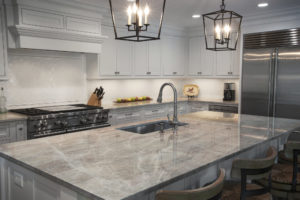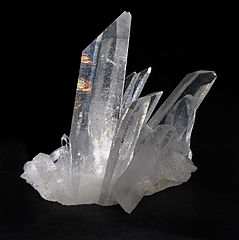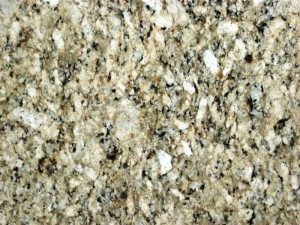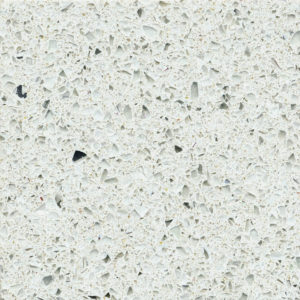
Quartz countertops have been a popular option for years and it has been a big kitchen design trend in 2017.
Countertops made from quartz are a popular choice because of their natural stone appearance, durability, and low maintenance. More homeowners than ever are choosing to install quartz counters in their new homes or renovated kitchens. They are also becoming more common in commercial restaurants as well.
Though we may be best known for our granite countertops, Graniterra is the leading supplier of quartz countertops in the St Louis area as well.
Call us with your questions at (314) 533-3366
In this guide to quartz countertops, we will educate you on the material and answer the most common questions about why to choose quartz for your countertops.
 What is quartz?
What is quartz?
Quartz is a naturally occurring mineral that is actually the second most abundant mineral in the earth’s crust. There are many varieties of quartz, some of which are considered semi-precious gemstones. Quartz has been used in jewelry and decorative arts for over a thousand years.
Is quartz in countertops natural or man-made?
The quartz in countertops is natural but the slabs they are made from are man-made. Unlike granite countertops which are created from slabs mined from the earth, granite countertops are engineered in factories. Natural quartz is the primary ingredient in quartz counters, which contain about 94% quartz, with the remaining 6% being man-made resins to bind it together and pigments for coloring.
Are quartz countertops cheaper than granite?
In the past, quartz was almost always more expensive than granite countertops. Today they are very comparable in cost. The difference in cost will have to do with the variety you end up choosing as there are more affordable and expensive options available for both.
Related: Three types of granite countertops
 Is quartz resistant to heat?
Is quartz resistant to heat?
Quartz countertops are resistant to heat and scorching up to a point. They can generally handle heat up to 400 degrees. Temperatures higher than that, or sustained heat on the counter could scorch or even crack the surface.
Will quartz countertops stain?
The hard surface of Quartz is non-porous and very resistant to staining, even better than marble. Quartz counters can resist oil, coffee, wine, juice and most other common kitchen spills. It is not 100% stain resistant though and is susceptible to stains from solvents, sodium hydroxide, and permanent markers.
Related: The Advantages and Disadvantages Of Quartz, Granite, And Corian Countertops
Will quartz countertops scratch?
Quartz countertops are extremely strong and very scratch resistant but can be scratched. You should not use abrasive cleaners or pads on quartz.
 Do quartz countertops need to be sealed?
Do quartz countertops need to be sealed?
Quartz is very hard and nonporous so unlike granite or marble, it never requires sealing.
How do you clean quartz countertops?
Quartz counters should be cleaned with a non-abrasive pad or washcloth using a mild soap and water mixture. You can also use water and white vinegar for cleaning. Grease can be cleaned away with a degreasing and disinfectant cleanser that doesn’t contain bleach. Dried chunks can be cleaned away with a blunt, plastic scraper such as a putty knife.
Related: How to clean quartz countertops
Do quartz countertops have seams?
Quartz does have seams but they will usually be almost invisible. Darker quartz counters do not show their seams, giving a very clean, modern look. With it’s wide variety of multiple colors and patterns available, some can be more difficult to hide, but they will still be less obvious than granite countertops.
Related: Stone and Installation Frequently Asked Questions
Are you ready to start looking at quartz, granite or other stone countertops?
View some of the residential remodeling projects we’ve completed for inspiration.
View our quartz and granite countertops.
Contact us with your questions or to get started.



